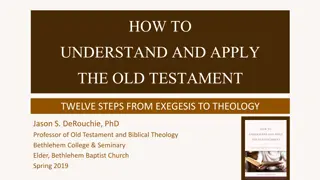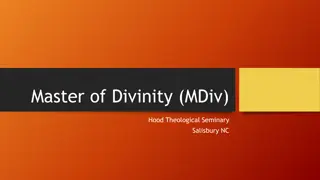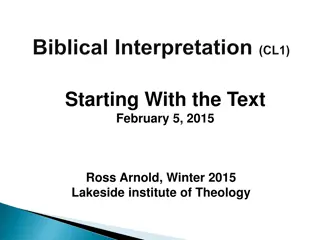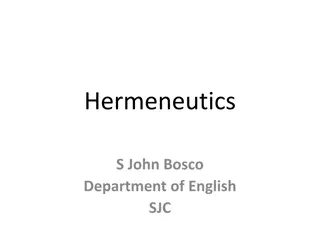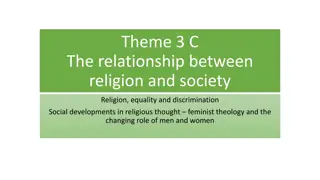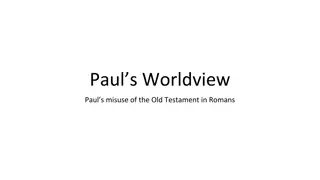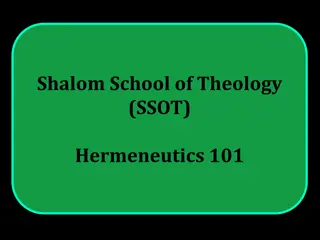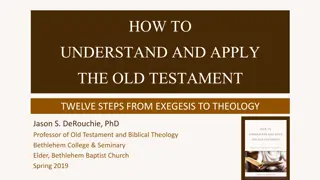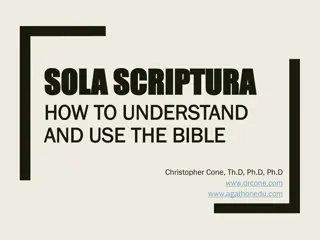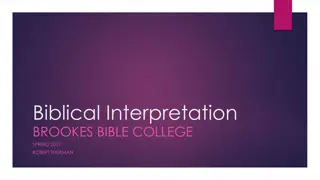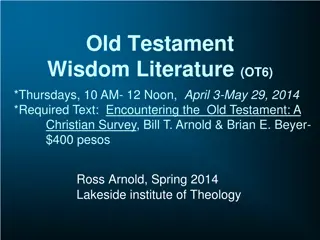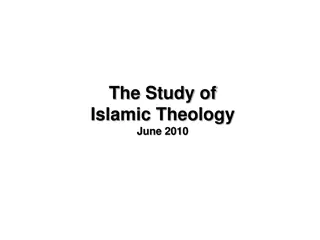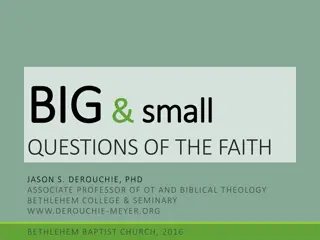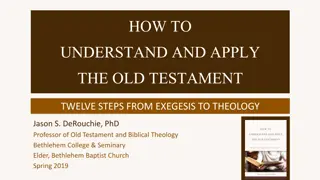Exploring Biblical Interpretation: History, Literature, and Theology
Delve into the importance of skilled biblical interpretation, the cost of failed interpretation, and the essential characteristics of a biblical interpreter. Understand the significance of humility, the role of the Spirit, and the need for accuracy in handling the Word of God. Learn about the hermeneutical triad of history, literature, and theology in this insightful exploration.
Download Presentation

Please find below an Image/Link to download the presentation.
The content on the website is provided AS IS for your information and personal use only. It may not be sold, licensed, or shared on other websites without obtaining consent from the author. Download presentation by click this link. If you encounter any issues during the download, it is possible that the publisher has removed the file from their server.
E N D
Presentation Transcript
Chapter 1 WELCOME TO THE HERMENEUTICAL TRIAD: HISTORY, LITERATURE, AND THEOLOGY
CHAPTER OUTLINE The Need for Skilled Biblical Interpretation The Cost of Failed Biblical Interpretation The Characteristics of the Biblical Interpreter The Purpose and Plan of This Book The History of Biblical Interpretation and the Hermeneutical Triad
THE NEED FOR SKILLED BIBLICAL INTERPRETATION Do your best to present yourself to God as one approved, a workman who does not need to be ashamed and who correctly handle the word of truth (2 Tim. 2:15). For the biblical interpreter, the most important question relates to knowing which tool to use and how to use it. This is what it means to correctly handle the word of truth. In so doing, we will long to hear God s words of approval, Well done, good and faithful servant. Enter the joy of your master.
THE COST OF FAILED BIBLICAL INTERPRETATION Scripture is not merely human words, but the Word of God. Thus, the biblical interpreter is charged with a sacred task: handling Scripture with accuracy. He or she is entrusted with a sacred object, God s word of truth, and his or her faithfulness or lack thereof will result in God s approval or the interpreter s shame. The considerable cost is shrinking back in shame at God s judgment by the one who is unwilling to pursue acquiring skills needed to interpret Scripture accurately.
THE COST OF FAILED BIBLICAL INTERPRETATION
THE CHARACTERISTICS OF THE BIBLICAL INTERPRETER Humility Rather than adopting a critical stance toward Scripture, we should submit to it as our final authority in all areas of life. We must recognize our finiteness and need for instruction and correction (2 Tim. 3:16). Listen carefully, study perceptively Guard your steps when you go to the house of God. Go near to listen rather than to offer the sacrifice of fools . . . Do not be quick with your mouth, do not be hasty in your heart to utter anything before God. God is in heaven and you are on earth, so let your words be few. (Eccl. 5:1 2) Adolf Schlatter s hermeneutic of perception.
THE CHARACTERISTICS OF THE BIBLICAL INTERPRETER Regenerate, Spirit-filled and -led The Spirit searches all things, even the deep things of God. For who among men knows the thoughts of man except the man s spirit within him? In the same way no one knows the thoughts of God except the Spirit of God. ... The man without the Spirit does not accept the things that come from the Spirit of God, for they are foolishness to him, and he cannot understand them, because they are spiritually discerned. The spiritual man makes judgments about all things, but he himself is not subject to any man s judgment ... (1 Cor. 2:10b 15)
THE HERMENEUTICAL TRIAD The Hermeneutical Triad
THE HERMENEUTICAL TRIAD History Since Christianity is a historical religion, and all texts are historically and culturally embedded, it is important that we ground our interpretation of Scripture in a careful study of the relevant historical setting. Literature Since Scripture is literature, the bulk of our interpretive work will entail coming to grips with the various literary and linguistic aspects of the biblical material. Theology Finally, since Scripture is not merely a work of literature but inspired and authoritative revelation from God, the goal and end of interpretation is theology.
HISTORY OF BIBLICAL INTERPRETATION The Old Testament, Jesus, and the Early Church The first instances of biblical hermeneutics are found in Scripture itself, the Old Testament and the New Testament. Recognition of dual authorship Respect for original intention of these authors Jesus as the hermeneutical axiom
HISTORY OF BIBLICAL INTERPRETATION The Apostolic Fathers and the Apologists These early interpreters of the Christian faith maintained that both Testaments were unified around Christ as their center and that all of Scripture must be interpreted within an overarching Christological framework. Biblical interpretation in this period exhibited a wide range of approaches from literal to typological (historical correspondence between a type and an anti-type), midrashic (commentary), and allegorical.
HISTORY OF BIBLICAL INTERPRETATION The Schools at Alexandria and Antioch The core difference between these two schools hinged on their approach to the biblical writings as history. While the Alexandrian school resorted to allegorical readings in which history took second place to an interpreter s perceived spiritual significance of a given OT character or event, the Antiochenes proceeded in the conviction that the primary level of exegesis was the historical one. Antioch constitutes an important precursor for the historical-grammatical interpretation propagated during the time of the Reformation.
HISTORY OF BIBLICAL INTERPRETATION Jerome Jerome translated the Bible into Latin, the Vulgate, which reigned supreme as the church s Scripture for the next 1,000 years. Jerome made it clear to his successors that the OT was an oriental book written in an oriental language and set in the oriental past. At the same time he fervently expressed the belief that the coming of Jesus showed that the Old Testament was a book of illumination and hope for all mankind (Rogerson, 46).
HISTORY OF BIBLICAL INTERPRETATION Augustine Augustine perhaps most reveals his hermeneutic in his work, The City of God. The impressive thing about The City of God is that it is an attempt to take the Old Testament seriously as history, and to consider how secular and sacred history are to be regarded in relation to each other. Jerome and Augustine stand as towering figures in biblical interpretation which remained unsurpassed for at least the next 600 years.
HISTORY OF BIBLICAL INTERPRETATION The Medieval Period Allegorical and mystical interpretations of the Old Testament reached a climax with Cyril of Alexandria (archbishop of Alexandria, AD 412 444), Gregory the Great (pope, AD 590 604), and the Venerable Bede (c. 672 735). Medieval exegesis is known primarily for its pursuit of the fourfold sense of Scripture: (1) literal (or historical); (2) allegorical (or spiritual); (3) tropological (or moral); and (4) anagogical (or future; from the Greek anagog , leading up to ).
HISTORY OF BIBLICAL INTERPRETATION The Reformation Luther Luther also rejected medieval allegorical interpretation and affirmed, with Aquinas, that Scripture had one essential meaning, the historical sense. Calvin As in the case of Luther, Calvin s primary concern lay with the literal, historical sense of the text. Calvin also affirmed a subjective element in interpretation, the internal witness of the Holy Spirit. Within this framework, his interpretation was Christological.
HISTORY OF BIBLICAL INTERPRETATION The Enlightenment Human reason questioned the very possibility of miracles, and anti-supernaturalism largely prevailed. This rationalistic mindset gave rise to a pronounced skepticism toward the scriptural data and led to the development of the historical-critical method.
HISTORY OF BIBLICAL INTERPRETATION The Modern Period Richard Simon, Father of biblical criticism F. C. Baur, T bingen School Julius Wellhausen, Documentary Hypothesis Friedrich Schleiermacher, Father of modern hermeneutics Interpretation consists of both an objective and a subjective element, grammatical as well as psychological. The historical critical method became unduly preoccupied with the question of history at the expense of an engagement with the Bible s literary and theological aspects.
HISTORY OF BIBLICAL INTERPRETATION The Modern Period Hans Frei The Eclipse of Biblical Narrative swung the pendulum the other way. Biblical scholarship was reduced to narrative criticism or various other forms of literary criticism. Scripture s historical dimension was unduly neglected, resulting in an imbalanced interpretation once again. Postmodernism Reader-response Deconstructionism
THE HISTORY OF BIBLICAL INTERPRETATION AND THE HERMENEUTICAL TRIAD The Hermeneutical Triad Only the approach to the study of Scripture that properly balances history, language, and theology is fully adequate. Applying the hermeneutical triad will develop: Historical-cultural awareness Canonical consciousness Sensitivity to genre Literary and linguistic competence A firm grasp of biblical theology An ability to apply and proclaim passages from every biblical genre to your own life and the life of your congregation.
GUIDELINES FOR BIBLICAL INTERPRETATION Preparation Recognize presuppositions Pray Interpretation Determine historical setting and relevant cultural background issues (History) Locate your passage in the larger canonical context of Scripture (Literature: Canon) Determine your passage s literary genre and use appropriate interpretive principles for interpreting each given genre (Literature: Genre) Read carefully and seek to understand your entire passage in its larger discourse context (Literature: Language) 1. 2. 1. 2. 3. 4.
GUIDELINES FOR BIBLICAL INTERPRETATION Interpretation Conduct a semantic field study of any significant terms in your passage (Literature/Language/Word Meanings). Identify any figurative language in your passage and interpret figures of speech in keeping with proper principles of interpretation (Literature/Figurative Language). Identify the major theological theme(s) in your passage and determine the passage s contribution to your understanding of the character and plan of God in dealing with his people (Theology). 5. 6. 7.
GUIDELINES FOR BIBLICAL INTERPRETATION Application & Proclamation Assess the contemporary relevance of your passage and make proper application to your own life and to the life of the church today 1.








